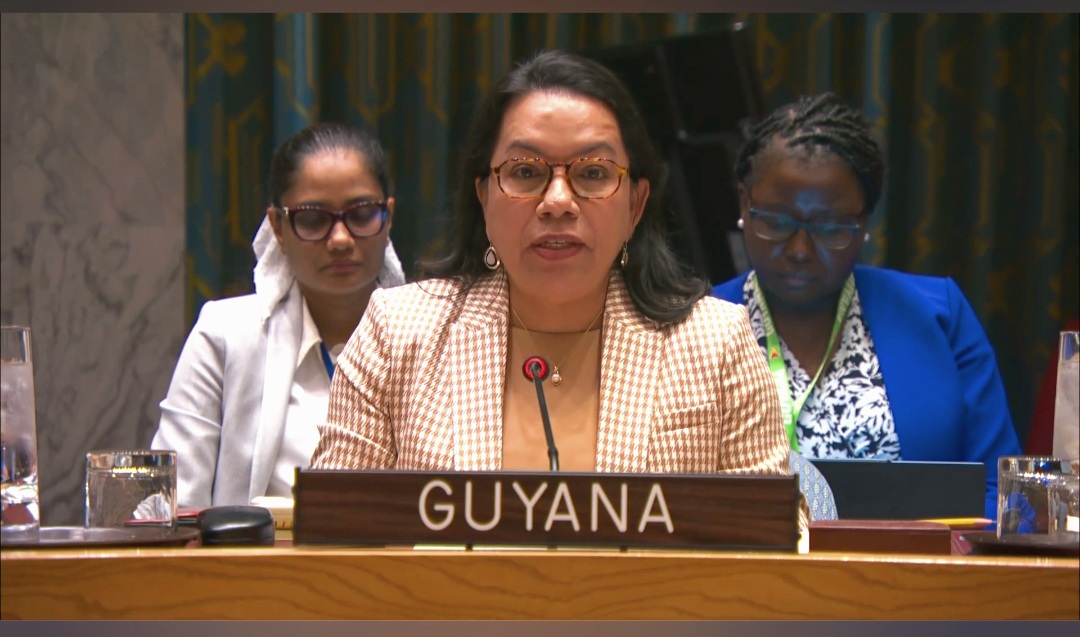Statement delivered by Her Excellency Carolyn Rodrigues-Birkett, Permanent Representative of Guyana to the United Nations, at the United Nations Security Council "Briefing by the United Nations High Commissioner for Refugees”
Thank you, Mr. President,
I thank High Commissioner Grandi for today's briefing and his frank assessment of the ongoing displacement crisis.
Guyana supports the critical work of the UN Refugee Agency and commends High Commissioner Grandi and his team for continuing to provide life-saving assistance and protection to millions of displaced people around the world, despite the growing number of challenges.
Mr. President,
We are undoubtedly in an era of rising geopolitical tensions, leading to unprecedented levels of armed violence and displacement. More than one hundred and twenty million (120 m) people were forcibly displaced in 2024. A global snapshot reveals that in the Americas, worsening gang violence in Haiti fueled by trafficked weapons from abroad, has resulted in more than one million people being internally displaced. In Africa, conflicts in Sudan and the DRC have driven around 30 million IDPs, refugees and asylum-seekers from their homes. In Asia, over 3.5 million people were internally displaced in Myanmar. The largest war on the European continent since World War 2 has driven over 10 million Ukrainians from their homes. And we continue to witness the repeated displacements in Gaza.
The rise in conflict-induced displacement and involuntary resettlement poses a significant challenge to humanitarian and development organizations that are already grappling with a global funding squeeze.
In 2025, an estimated 10.2 billion dollars is needed to provide life-saving protection and assistance to a projected population of over 139 million forcibly displaced and stateless people. These numbers are staggering and demand our urgent attention, especially as the gap between needs and commitment continues to widen, leaving the humanitarian sector chronically underfunded.
Mr. President,
None of us are insulated from the impacts of the ongoing displacement crisis; whether directly, through the influx of people across our borders or indirectly through the spectrum of side-effects that it engenders. We are all impacted. For the middle- and low-income countries that host 71 percent of the world’s refugees and others in need of international protection, the impacts on their social systems and national budgets are severe. In the health sector alone, a global cost analysis for including refugees in national health services estimates that this would require $11 billion dollars per year.
The imperative to accelerate the global response is clear. We must intensify our efforts to address the humanitarian needs of the forcibly displaced. At the same time, there must be greater urgency in addressing the drivers of conflict and displacement. Mass displacement is just one of the symptoms of the disease of war, violence and economic instability.
Climate change is also becoming a major driver of displacement. According to the 2024 Global Report on Internal Displacement over the past 10 years, weather-related disasters have caused 220 million people to be internally displaced. Further, as climate disasters impact destination countries, the options for escape narrow, creating a protracted displacement crisis.
We must also acknowledge that migration exists as both a result and a driver of conflict.
If we fail to adequately address these challenges, we will create a global cycle of unending and worsening tragedies. In the toolbox of solutions, the UNHCR is key. Yet, the Agency cannot act alone; it requires the cooperation and support of all Member States and must be equipped with the resources necessary to effectively fulfill its mandate. This includes financial resources. We note that as of February UNHCR had only received 14% of the required funding.
Guyana also continues to advocate for a comprehensive and strategic approach in addressing the deficits in development which lay at the root of the great majority of conflicts. The cost of inaction and failing to prioritize and invest in development and conflict prevention is simply too high.
Mr. President,
In closing, it bears repeating that the work of UNHCR and its partners is vital. We can and must enable them to continue to provide essential life-saving services such as shelter, water, health care and education. Guyana is committed to maintaining and further enhancing our partnership with the UNHCR and will continue to advocate for increased support for the agency.
I thank you!


